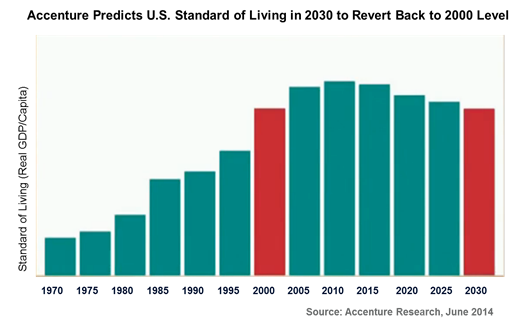Accenture: Standard of living to decrease, up to states to fix
 The long belief in America is that life will be better for future generations than it is today. But that may no longer be the case as certain population and workforce metrics predict the standard of living to begin decreasing over the next 20 years, according to a new study from Accenture.
The long belief in America is that life will be better for future generations than it is today. But that may no longer be the case as certain population and workforce metrics predict the standard of living to begin decreasing over the next 20 years, according to a new study from Accenture.
The report, U.S. States: For Richer, For Poorer? Winning the battle for talent and securing our standard of living, points to the nation’s shrinking working-age population, a decrease in the percentage of people who are working and a dropping work productivity rate.
If these trends continue, Accenture argues, the standard of living in the United States in 2030 will drop below the level it was at in 2000.
“This is not the function of any one decision, but a variety of factors that have come together and are creating a future standard of living that goes against what people in this country grew up to believe,” said Peter Hutchinson, Accenture’s managing director for public service strategy, in an interview with StateScoop.
The good news, though, is the trend is reversible if state governments develop and execute strategies to ensure a sufficient supply of talent to meet the country’s workforce demands.
Hutchinson said state and local governments hold the most power in changing the tide of this trend as they sit at a fulcrum point between the federal government’s job-creating programs and the general population.
In the study, Accenture pointed to four things that state governments can do to help change this trend before it happens:
-
Real-time information on the demand and supply of skills and competencies. Today’s jobs and skill needs are different from those in the past, making historical data an unreliable predictor of future talent demand or supply. Accenture recommends that states provide real-time, skill- based information about jobs that are in high demand and promote the workforce qualifications needed to fill those jobs; this will result in better directing employers to the right pools of talent, helping job seekers match their skills with employer needs, and engaging educators to focus on developing the employment skills needed for today’s economy.
-
Talent supply pipelines. States should create talent supply pipelines that can provide employers, including government, with reliable access to the skills and competencies they need.
-
Roadmaps showing pathways to jobs. States should offer every job seeker a personalized road map that shows him or her how to put unique talents to work to gain the skills and competencies needed for the desired job.
-
United talent agenda focused on increasing standard of living. States should create a unified, statewide talent agenda that pulls together all related agencies, programs and budgets that focuses on increasing the standard of living.
Real-time information on the demand and supply of skills and competencies. Today’s jobs and skill needs are different from those in the past, making historical data an unreliable predictor of future talent demand or supply. Accenture recommends that states provide real-time, skill- based information about jobs that are in high demand and promote the workforce qualifications needed to fill those jobs; this will result in better directing employers to the right pools of talent, helping job seekers match their skills with employer needs, and engaging educators to focus on developing the employment skills needed for today’s economy.
Talent supply pipelines. States should create talent supply pipelines that can provide employers, including government, with reliable access to the skills and competencies they need.
Roadmaps showing pathways to jobs. States should offer every job seeker a personalized road map that shows him or her how to put unique talents to work to gain the skills and competencies needed for the desired job.
United talent agenda focused on increasing standard of living. States should create a unified, statewide talent agenda that pulls together all related agencies, programs and budgets that focuses on increasing the standard of living.
Hutchinson pushed home that last point as well. He said the federal government has 47 different programs with $18 billion in combined funding available to state governments. The problem is navigating these vast programs is incredibly difficult.
A number of the programs overlap in some areas while others are completely in silos. Each brings with it a number of qualifications and standards that must be followed.
“States need to find better ways to take advantage of these programs,” Hutchinson said. “It’s an organizational issue and a big one, but something they can bring together and combined with our other calls for action can make a huge difference in the long run.”
As for technology, Hutchinson said it is both the solution and problem to this problem. He said those who are not tech savvy have a problem in today’s labor market and the systems created for job creation have not kept pace with the changing face of technology job recommendations.
With that said, Hutchinson said technology can also be used to collect and analyze job force data along with better connecting employers and job seekers to the right position.






